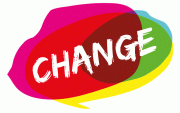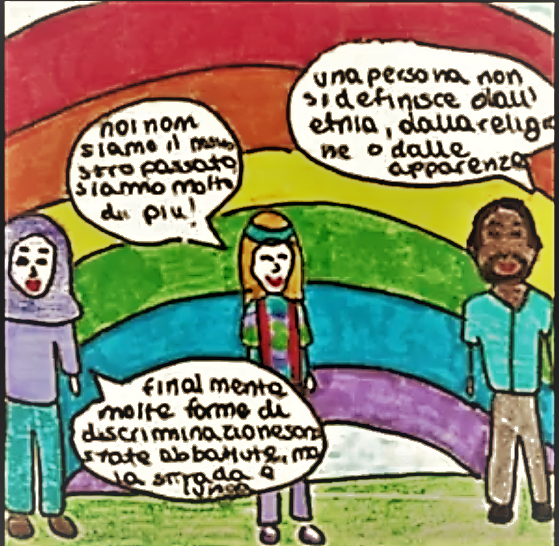Middle school students from Santa Maria delle Mole, near Rome, talk about their experience meeting refugees. After the meeting, they launched an initiative under the CHANGE Student Ambassador Programme.
“It all started with two classes in our school, with help from our Music, Italian, Art, and Support teachers. CHANGE’s modules made us think about the meaning of prejudice, and helped us realise what we know about the conditions in which refugees find themselves. Then, we met two refugees, who told us about all the hardships they faced in their countries of origin. They left their families behind and went on a gruelling journey to find a better life.
Even with the difficulties caused by COVID-19, we’ve been able to keep studying thanks to distance learning.
This journey has been summarised in a video that opens on anonymous faces, showing people we don’t personally know, but of whom we have preconceived notions due to the person’s fame or stereotypes about their home country. Instead, in the end, we see our smiles, representing overcoming prejudice and demonstrating the positive message that, by removing the mask of bigotry, we come to understand that behind every anonymous face, there is a person, a life, a story. As examples, we’ve chosen the stories and songs of a few artists: Africa is Where my Heart Lies by Miriam Makeba, the girls who founded the Afghan Zohra Orchestra and their music, the Afghan poet Nadia Anjuman, Ahmad Joudeh dancing to Inshallah by Sting, War by Bob Marley, We Shall Overcome by Joan Baez, Prayer of the Mothers by Yael Deckelbaum, and finally The Price of Silence, written to celebrate the 60th anniversary of the signing of the Universal Declaration of Human Rights.
We have understood that music can be a way to deliver wonderful messages, and we can use it to fight for everyone’s rights, to break down the walls built by prejudice, and to create a society that can integrate everyone.”
Italian version
Dal pregiudizio all’integrazione attraverso la musica
Gli studenti di una scuola media di Santa Maria delle Mole, vicino Roma, raccontano la loro esperienza di incontro e conoscenza con i rifugiati. A seguito di questo incontro hanno realizzato una iniziativa nell’ambito dello Student Ambassador Programme di CHANGE.
“Tutto è iniziato in due classi della nostra scuola, insieme alle nostre professoresse di musica, italiano, arte e sostegno.
I moduli del percorso CHANGE ci hanno fatto riflettere sul significato di pregiudizio, e ci hanno aiutato a capire cosa sapevamo sulle condizioni dei rifugiati. Abbiamo poi avuto un incontro con due rifugiati, che ci hanno raccontato la vita molto complicata nei propri paesi di origine e, per questo, hanno deciso di abbandonare la propria famiglia e di affrontare un arduo viaggio per avere una vita migliore.
Successivamente, nonostante le difficoltà dovute al covid, siamo riusciti ad andare avanti con la didattica a distanza, continuando ad imparare cose nuove.
Tutto il percorso è stato racchiuso in un video che si apre con dei volti anonimi, di persone che non conosciamo direttamente, ma sulle quali spesso ci facciamo delle idee, perché famose o legate ai luoghi comuni sui loro paesi di origine; nel finale invece si vedono i nostri sorrisi che mostrano il messaggio positivo e rappresentano il superamento dei pregiudizi: se togliamo la maschera del pregiudizio, dietro ogni volto anonimo c’è una persona, la sua vita, la sua storia.
Abbiamo scelto come esempio le storie e le canzoni di alcuni artisti: Miriam Makeba e “Africa is where my heart lies”, le ragazze che hanno fondato l’orchestra afghana Zohra e le loro musiche, la poetessa afghana Nadia Anjuman, Ahmad Joudeh che balla sulla musica di Inshallah, Bob Marley e “War”, Joan Baez e “We shall overcome”, Yael Deckelbaum e “Prayer of the mothers”, ed infine “The price of silence”, scritta per il sessantesimo anniversario della Dichiarazione Universale dei Diritti Umani.
Abbiamo capito che la musica può diventare uno strumento per trasmettere dei messaggi stupendi e con essa si può combattere per difendere i diritti di tutti, per abbattere i muri che creano che vengono creati dai pregiudizi, per creare una società che possa integrare ognuno”.

